- Size
- Smallest
- Small
- Small to Medium
- Medium
- Large
- Giant
- Characteristics
- Smartest
- Hypoallergenic
- Fluffy
- Best Guard
- Best Family
- Best for Kids
- Low Shedding
- Healthiest
- Police Dogs
- Most Calm
- Quietest
- Color
- White
- Black
- Grey
- Brown
- Blue
- Red
- Coat
- Hairless
- Short
- Long
- Origin
- Japan
- China
- Australia
- Germany
- Italy
- United States
- France
- Group
- Hound
- Terrier
- Herding
- Toy
- Working
- Sporting
What Is A Dog's Way Of Kissing? And Truly Meaning
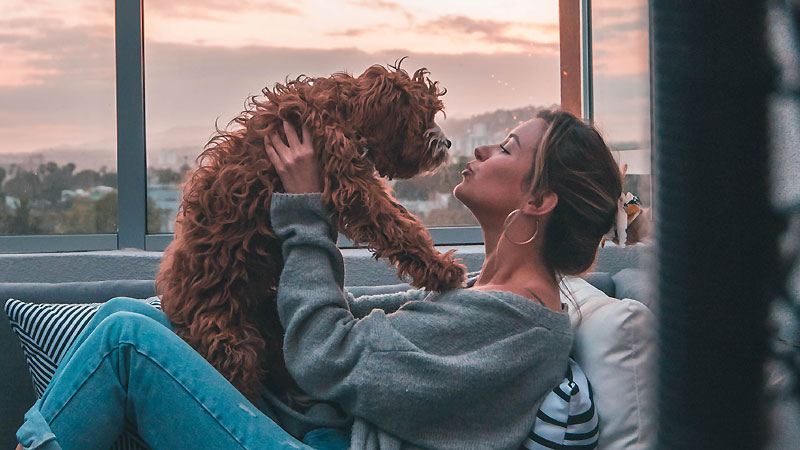
Photo by Roberto Nickson on Unsplash
Dogs, often touted as "man's best friend," have an incredible ability to express love and affection in ways that resonate with their human companions. One of the most endearing and recognizable displays of canine affection is the act of "kissing." But what does a dog's kiss really mean, and how does it compare to the way humans express love? In this exploration, we'll delve into the fascinating world of doggy kisses and decipher the nuanced language behind this heartwarming behavior.
The Canine Kiss: More than a Mere Lick
1. The Anatomy of a Doggy Kiss:
While humans might think of a kiss as a romantic or familial gesture involving lips, dogs lack the same facial features to engage in such a display. Instead, a dog's version of a kiss involves the act of licking. This wet and slobbery display might not seem as refined as a human kiss, but it holds profound meaning in the canine world.
2. Communication Through Scent:
For dogs, the primary mode of communication is through scent. Licking allows them to gather information about their surroundings and, more importantly, about the people they interact with. When a dog licks, they are essentially tasting the unique cocktail of scents that defines an individual, including their emotional state, recent activities, and overall well-being.
The Various Meanings Behind Doggy Kisses
1. Affection and Bonding:
At its core, a dog's kiss is a gesture of affection and bonding. When a dog licks its owner's face, it's a demonstration of love and a desire to connect. This behavior is deeply rooted in a dog's pack mentality, where mutual grooming and physical contact strengthen social bonds.
2. Submission and Respect:
In the wild, subordinate pack members often lick the faces of higher-ranking members as a sign of submission and respect. Domestic dogs have carried this behavior into their relationships with humans, viewing their owners as the leaders of their pack. A dog's kiss, therefore, can be a way of acknowledging your position as the alpha in their social structure.
3. Comfort and Stress Relief:
Dogs may also resort to licking when they feel stressed or anxious. This self-soothing mechanism helps them cope with various situations, and when directed toward their human companions, it can be a way of seeking comfort and reassurance during challenging times.
Deciphering the Doggy Kiss: What Your Dog's Licks Might Mean
1. A Light Peck:
A gentle, brief lick might signify a casual greeting or a quick expression of affection. Your dog might just be saying, "Hello, I'm happy to see you!"
2. Sustained Licking:
If your dog engages in prolonged licking, it could be an indication of heightened excitement or joy. This enthusiastic display often occurs when you return home after an absence or during playtime.
3. Licking Your Face:
When a dog specifically licks your face, it's a sign of trust and deep affection. Your face is a treasure trove of scents, and your dog's desire to explore it reflects their strong connection with you.
The Not-So-Romantic Side of Doggy Kisses
While doggy kisses are generally a positive and affectionate behavior, it's crucial to acknowledge that there are instances where excessive licking might raise concerns:
1. Health Considerations:
Excessive licking can lead to skin irritation for both the dog and the human recipient. Additionally, dogs may ingest fur during the licking process, potentially causing digestive issues. If you notice persistent licking or changes in your dog's behavior, consulting with a veterinarian is advisable.
2. Setting Boundaries:
Not everyone appreciates being showered with doggy kisses, and it's essential to establish and respect personal boundaries. Consistent training can help teach dogs when it's appropriate to engage in licking behavior and when it's not.
Encouraging Positive Behavior
If you enjoy the affectionate nature of doggy kisses, there are ways to encourage positive behavior:
1. Positive Reinforcement:
Offer praise, treats, or affection when your dog exhibits calm and controlled licking behavior. This reinforces positive conduct and helps them understand the appropriate times to express affection.
2. Training and Consistency:
Consistent training sessions can help establish boundaries and reinforce desirable behavior. Use verbal cues like "enough" or "no lick" to signal when it's time to stop.
Conclusion
In the intricate tapestry of human-canine relationships, doggy kisses hold a special place. Understanding the language behind a dog's lick allows us to appreciate the depth of their affection and the unique ways they express love and connection.
While the act of licking might not be as refined as a human kiss, its significance in the canine world is immeasurable. So, the next time your furry friend showers you with slobbery kisses, remember that it's their way of saying, "You are an essential part of my pack, and I love you unconditionally."
You May Also Like
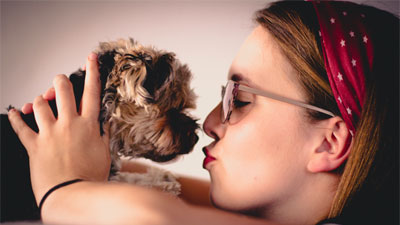 Help & AdviceThe Art of Giving Your Dog a Kiss and The Dos and Don'ts
Help & AdviceThe Art of Giving Your Dog a Kiss and The Dos and Don'ts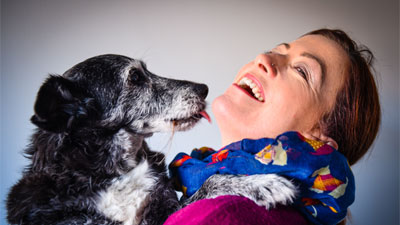 Help & AdviceTraining Your Dog to Give Kisses: A Step-by-Step Guide
Help & AdviceTraining Your Dog to Give Kisses: A Step-by-Step Guide Dog BehaviorDeciphering Dog Sleeping Positions: The Side Sleeper Pose
Dog BehaviorDeciphering Dog Sleeping Positions: The Side Sleeper Pose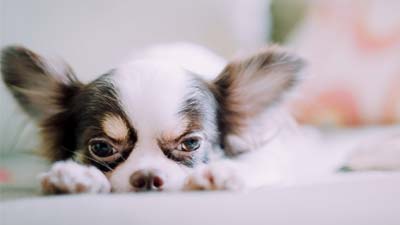 Dog BehaviorDeciphering Dog Sleeping Positions: The "Sphinx" Pose
Dog BehaviorDeciphering Dog Sleeping Positions: The "Sphinx" Pose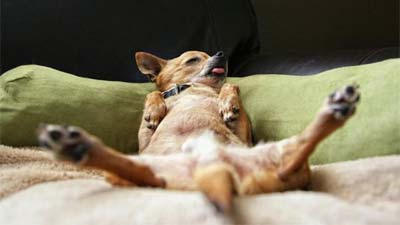 Dog BehaviorWhy Does My Dog Sleep Belly Up? Reasons Behind
Dog BehaviorWhy Does My Dog Sleep Belly Up? Reasons Behind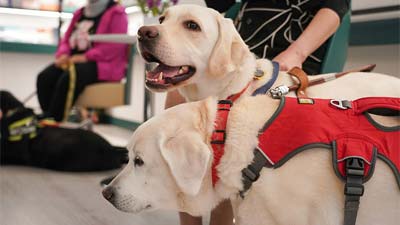 Dog BreedsBreed Guide: Choosing the Best Service Dog Breeds
Dog BreedsBreed Guide: Choosing the Best Service Dog Breeds